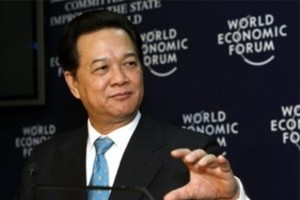In the past twenty years, under the guidance of the Vietnamese communist party, Viet Nam’s reforming process with one of its most important contents being the integration into the world’s economy has achieved great historical successes. Viet Nam has had basic and comprehensive changes. The greatest achievement of all is that the country’s economy has got out of crisis and started to grow quickly, improving the people’s life.

In order to carry out reform efforts and to achieve success, the country’s government and Party have had quite a few policies on economic development and international integration.
In this tenth congress, the Party intends to have more reforms, further integration in order to give more freedom to social production, to release businesses from opressing procedures, which helps the economy develop more quickly and more sustainably.
There will be no economic boom for Viet Nam if there is no opening of the economy and the market, and no integration into the regional and international economies.
The fast development of science and technology has created a new stage of development for the world’s economy, regulating global production relations, cracking down the territorial barriers and facilitating economic globalization. It is the inevitable development of the world’s economy. In return, economic globalization has motivated and facilitated the faster development of the world’s economy.
Every country, whether it is big or small, rich or poor, is aware of the fact that globalization will provide them with opportunities for development if they are to seize the chances. Viet Nam’s neighboring countries, typically China, regard integration and participation into the globalization as a chance to help their countries prosper. China is regaining its past power of a strong country.
On the other hand, globalization cannot affect the whole world. Currently, the wind of globalization has not been able to cool down the heat of African deserts.
According to foreign investors’ attitudes and assessment on Viet Nam’s investment environment and the openness of the Vietnamese economy, and on the behaviors of administrative agencies towards local and foreign businesses, it can be said that Viet Nam is still an observer of the world game and of globalization. The risk of being left behind is still there if Viet Nam does not take its initiatives and hurry up.

Globalization is also being exploited and dominated by powerful economic forces; therefore, globalization brings challenges, too. However, those superpowers need players to have a game, and Viet Nam, though small and weak, can become a player and have a share of the game.
With the above thoughts, I would like to have some ideas on the realization of policies of active integration into the world’s economy, as it is introduced in the Draft Political Report for the Tenth Party Congress.
1. Globalization of economy, information technology and the Internet has created an international economy, which is binding, close-knit, mutually dependent and supplementary to each other. The old thinking of “construction of an dependent and self-controlled economy” is like building castles in the air. Viet Nam should find a way suitable to its ability and suitable to the era, upholding its potential and advantages while keeping to the development roadmap of the world’s economy.
2. It is clear that the road to integration is inevitable. Anyone who fails to see that it is the only right way to follow should learn by himself. He should not talk out, damage the game and prevent the country from taking steps to the new era.
3. Integration into the common playground requires the conformation to the rules. It is impossible to force the integration roadmap to “follow the country’s development strategies”. The integration process should be taken into account in planning the country’s development strategies.
4. Integration should be regarded as an opportunity to ameliorate the country. Viet Nam should take initiatives and hurry up, both domestically and internationally. Opportunities should not be lost because of being inactive.
It is impossible to see that Decree 07 by the Politbureau on economic integration, issued after the Ninth Party Congress and the Decision 37/QD-TTg on the action plan for the realization of Decree 07, issued soon afterward, have remained ineffective so far, although the two documents state clearly the integrative targets, contents, and each branches and levels’ work.
There should not have been so much time wasted to negotiate for keeping what the world has abandoned for years and what, according to WTO principles, are expected to be renounced immediately after being admitted. Things like the continuation of protectionism, high tarriffs, export subsidy, the maintaining of other issues in the fields of intellectual rights protection and investment, Animal Inspection Agreement or General Tarriff Agreement have become things of the past. The negotiation for them is a waste of time and opportunities, delaying Viet Nam’s admission into the organization.
5. Much has been discussed on the policies and measures of integration but there has not been any general strategy to guide Viet Nam on the way, keeping the country away from stumbling.
By Nguyen Dinh Luong – Former Head of the Vietnamese Delegation for the Negotiation of the Viet Nam – US Bilateral Trade Agreement.




















